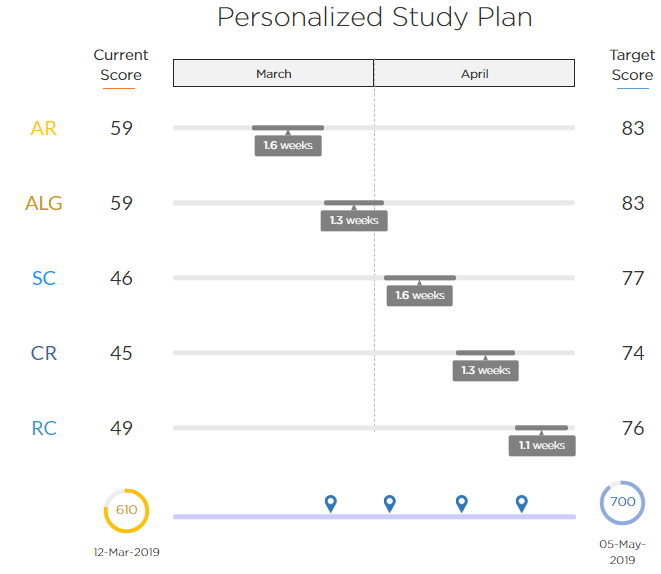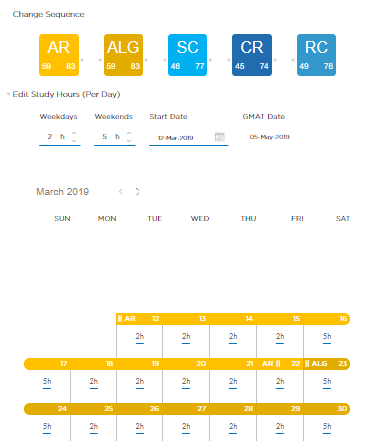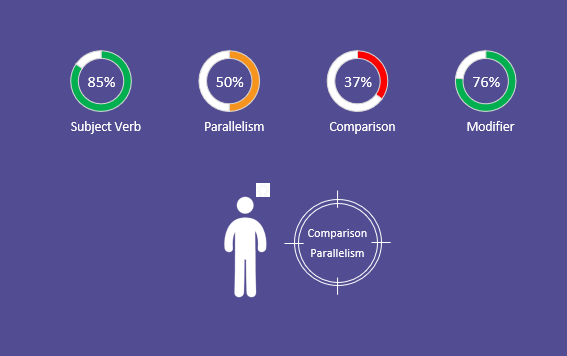Hi Appler,
I’m glad you reached out, and I’m happy to help. I think the main issue here is that despite studying pretty hard and working with a tutor, your verbal score seems to have hit a ceiling, right? Since you need to make a major improvement in verbal to hit your 700+ goal score, rather than trying to develop a micro-plan based on your ESR, you really need to spend time improving in ALL ASPECTS of verbal. So, make sure that you are following a linear and structured study plan that allows you to individually learn each verbal topic, starting with the foundations before moving to more advanced concepts. By studying in such a way, you can ensure that you methodically improve your verbal skills and leave no stone unturned.
For example, when studying Critical Reasoning, you need to ensure that you fully understand the essence of the various question types. Do you know the importance of an assumption within an argument? Can you easily spot a conclusion? Do you know how to resolve a paradox? Do you know how to properly evaluate cause and effect? Do you know how to properly weaken or strengthen an argument? These are just a few examples; you really need to take a deep dive into the individual Critical Reasoning topics to develop the necessary skills to properly attack any Critical Reasoning questions that you encounter.
As you learn each Critical Reasoning problem type, do focused practice so that you can track your skill in answering each type. If, for example, you incorrectly answered a Weaken the Argument question, ask yourself why. Did you make a careless mistake? Did you not recognize the specific question type? Were you doing too much analysis in your head? Did you skip over a keyword in an answer choice? You must thoroughly analyze your mistakes and seek to turn weaknesses into strengths by focusing on the question types you dread seeing and the questions you take a long time to answer correctly.
When practicing Reading Comprehension, you need to develop a reading strategy that is both efficient and thorough. Reading too fast and not understanding what you have read are equally as harmful as reading too slow and using up too much time. When attacking Reading Comprehension passages, you must have one clear goal in mind: to understand the context of what you are reading. However, you must do so efficiently, so you need to avoid getting bogged down in the details of each paragraph and focus on understanding the main point of each paragraph. That being said, do not fall into the trap of thinking that you can just read the intro and the conclusion and comprehend the main idea of a paragraph. As you read a paragraph, consider how the context of the paragraph relates to previous paragraphs, so you can continue developing your overall understanding of the passage. Furthermore, as you practice, focus on the exact types of questions with which you struggle: Find the Main Idea, Inference, Author’s Tone, etc. As with Critical Reasoning, analyze your incorrect answers to better determine why you tend to get a particular question type wrong, and then improve upon your weaknesses. You can perfect your reading strategy with a lot of practice, but keep in mind that GMAT Reading Comprehension passages are not meant to be stimulating. So, to better prepare yourself to tackle such bland passages, read magazines with similar content and style, such as the Economist, Scientific American, and Smithsonian.
Sentence Correction is a bit of a different animal compared to Reading Comprehension and Critical Reasoning. There are three aspects to getting correct answers to GMAT Sentence Correction questions: what you know, such as grammar rules, what you see, such as violations of grammar rules and the logic of sentence structure, and what you do, such as carefully considering each answer choice in the context of the non-underlined portion of the sentence. To drive up your Sentence Correction score, you likely will have to work on all three of those aspects. Furthermore, the likely reason that your Sentence Correction performance has not improved is that you have not been working on all three of those aspects.
Regarding what you know, first and foremost, you MUST know your grammar rules. Let's be clear, though: GMAT Sentence Correction is not just a test of knowledge of grammar rules. The reason for learning grammar rules is so that you can determine what sentences convey and whether sentences are well-constructed. In fact, in many cases, incorrect answers to Sentence Correction questions are grammatically flawless. Thus, often your task is to use your knowledge of grammar rules to determine which answer choice creates the most logical sentence meaning and structure.
This determination of whether sentences are well-constructed and logical is the second aspect of finding correct answers to Sentence Correction questions, what you see. To develop this skill, you probably have to slow way down. You won't develop this skill by spending under two minutes per question. For a while, anyway, you have to spend time with each question, maybe even ten or fifteen minutes on one question sometimes, analyzing every answer choice until you see the details that you have to see in order to choose the correct answer. As you go through the answer choices, consider the meaning conveyed by each version of the sentence. Does the meaning make sense? Even if you can tell what the version is SUPPOSED to convey, does the version really convey that meaning? Is there a verb to go with the subject? Do all pronouns clearly refer to nouns? By slowing way down and looking for these details, you learn to see what you have to see in order to clearly understand which answer to a Sentence Correction question is correct.
There is only one correct answer to any Sentence Correction question, there are clear reasons why that choice is correct and the others are not, and those reasons are not that the correct version simply "sounds right." In fact, the correct version often sounds a little off at first. That correct answers may sound a little off is not surprising. If the correct answer were always the one that sounded right, then most people most of the time would get Sentence Correction questions correct, without really knowing why the wrong answers were wrong and the correct answers were correct. So, you have to go beyond choosing what "sounds right" and learn to clearly see the logical reasons why one choice is better than all of the others.
As for the third aspect of getting Sentence Correction questions correct, what you do, the main thing you have to do is be very careful. You have to make sure that you are truly considering the structures of sentences and the meanings conveyed rather than allowing yourself to be tricked into choosing trap answers that sound right but don't convey logical meanings. You also have to make sure that you put some real energy into finding the correct answers. Finding the correct answer to a Sentence Correction question may take bouncing from choice to choice repeatedly until you start to see the differences between the choices that make all choices wrong except for one. Often, when you first look at the choices, only one or two seem obviously incorrect. Getting the right answers takes a certain work ethic. You have to be determined to see the differences and figure out the precise reasons that one choice is correct.
To improve what you do when you answer Sentence Correction questions, seek to become aware of how you are going about answering them. Are you being careful and looking for logic and details, or are you quickly eliminating choices that sound a little off and then choosing the best of the rest? If you choose an incorrect answer, consider what you did that resulted in your arriving at that answer and what you could do differently in order to arrive at correct answers more consistently. Furthermore, see how many questions you can get correct in a row as you practice. If you break your streak by missing one, consider what you could have done differently to extend your streak.
As with your Critical Reasoning and Reading Comprehension regimens, after learning a particular Sentence Correction topic, engage in focused practice with 30 questions or more that involve that topic. As your skills improve, you will then want to practice with questions that test you on skills from multiple Sentence Correction topics.
You also may find my article with more information regarding
how to score a 700+ on the GMAT helpful.
Feel free to reach out with any questions.
Good luck!










